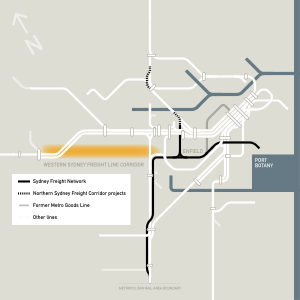Southern Sydney Freight Line
| Southern Sydney Freight Line | |
|---|---|
|
New South Wales Metropolitan Rail Area with Sydney Freight network highlighted in black. | |
| Overview | |
| Type | Freight |
| Operation | |
| Owner | Australian Rail Track Corporation |
Yellow: Route constructed as part of the SSFL project
Green: Existing relief line incorporated into the project
Grey: Existing Metropolitan Goods Railway Line
The Southern Sydney Freight Line (SSFL) is a freight only railway line in the south-western suburbs of Sydney, Australia. The line was constructed to avoid a curfew for freight trains that restricts them from operating in the suburban area during peak hours.
The SSFL forms part of a dedicated freight only corridor between Macarthur and Port Botany. The line is managed by the Australian Rail Track Corporation (ARTC), while the adjacent passenger lines are managed by RailCorp.
Route
The SSFL branches from and runs parallel to the Main South line for its full 36 kilometre length from Macarthur to Birrong. The line is an unelectrified, bi-directional single track with 1,800m long passing loops at Glenfield and Leightonfield.[1] Apart from its end points, the SSFL has no interface with the existing network.
From a junction south of Macarthur, the line runs to the west of the existing tracks to Ingleburn where it joins an existing relief line to Glenfield built in the mid-1990s.[2] Just north of Glenfield the line crosses to the east of the existing tracks via a flyover, with potential access to the proposed Moorebank freight terminal.[3] The line continues to parallel the Main South line to Sefton, incorporating the existing Leightonfield Freight loop and sidings. At Sefton Junction, the line passes under the Bankstown line and joins the Metropolitan Goods line which provides access to the Enfield and Port Botany marshalling yards.[4]
History

Delays to freight services operating to and from Sydney via the Main South line had long been a problem, but it wasn't until the formation of the National Rail Corporation that any plan was devised to resolve it.[2]
In February 1992, the Federal Government allocated $71m for the construction of a dedicated freight line from Macarthur to Enfield as part of the One Nation infrastructure project. It soon became apparent that to complete the project would cost in the region of $250m. Instead the funding was used to complete a number of smaller projects, including building a 6.6 kilometre relief line between Ingleburn and Glenfield. This single, non-electrified line was used by both CountryLink passenger and freight services.[2]
Construction
In May 2006, the Australian Rail Track Corporation revived the project.[5][6] Approval was obtained in October 2008 and construction commenced in early 2009, focusing on the section between Cabramatta and Sefton.[1] By August 2009 construction was under way along the whole corridor. In November 2009 poor planning led to the ARTC suspending the project for 10 months while it relocated utilities.[7][8]
In September 2010 the ARTC announced the resumption of the project with an estimated completion date of early 2013.[9][10]
In June 2012, the Sefton Junction to Leightonfield section opened allowing the connection from the yard at the latter to the RailCorp network to be severed.[11] In December 2012, the rest of the line was completed[12] officially opening on 21 January 2013.[13][14]
Station works

The construction of the new line required modifications to several stations along the route. Minto, Casula, Warwick Farm and Sefton received Easy Access upgrades. A new concourse was constructed at Cabramatta and the footbridge was extended at Leumeah.[1]
Services
The line is normally only used by freight services, but during engineering possessions on the adjacent RailCorp tracks, NSW TrainLink XPT services have travelled on it. Freight trains travelling to the Minto Container Terminal continue to travel on RailCorp tracks.
Future
Transport for NSW is planning to construct a Western Sydney Freight Line and provide a capacity enhancement for the SSFL sometime after 2024.[15]
See also
- Rail Clearways Program
- Northern Sydney Freight Corridor - a similar project in the north
- Railways in Sydney
- Regional Rail Link - a similar project in Melbourne separating local and long distance services
References
- 1 2 3 Tackling Congestion on the Sydney Rail Freight Network Minister for Infrastructure and Transport 5 February 2009
- 1 2 3 "The Glenfield - Ingleburn Passing Loop Project" Railway Digest August 1994 Page 8
- ↑ Moorebank Intermodal Terminal Project Department of Finance & Deregulation
- ↑ Corridor Description Australian Rail Track Corporation Proposal
- ↑ Southern Sydney Freight Line Parsons Brinckerhoff April 2006
- ↑ Southern Sydney Freight Line Submissions Report Parsons Brinckerhoff August 2006
- ↑ "Planning snags halt rail project" Sydney Morning Herald 3 November 2009
- ↑ "Southern Sydney Freight Line cost blowout" RailExpress.com.au 30 March 2011
- ↑ Southern Sydney Freight Line Back on Track Australian Rail Track Corporation 14 September 2010.
- ↑ "SSFL Program of Works" (PDF). ARTC. Retrieved 28 October 2011.
- ↑ SAFE Notice 2-1707 Australian Rail Track Corporation June 2012
- ↑ "SAFE Notice 2012. Number:2-1821 Enfield West to Glenlee. Commence operation of Southern Sydney Freight Line" (PDF). Australian Rail Track Corporation. 14 December 2012. Retrieved 23 January 2013.
- ↑ Jacob Saulwick (21 January 2013). "'We wanted to make sure we got it right': new rail line opens ... three years late". Sydney Morning Herald. Fairfax Media. Retrieved 21 January 2013.
- ↑ New Line to Reduce Congestion on Sydney Rail Network Opens Australian Rail Track Corporation 21 January 2013
- ↑ "Sydney CBD to Parramatta Strategic Transport Plan" (PDF). Transport for NSW. September 2015. p. 37. Retrieved 18 September 2015.
